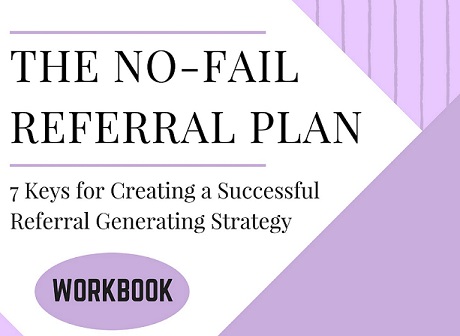Practice Building Advice So That You Will
Never Worry Have to About Referrals Again!

5 Steps to Take This Year to Fill Your Practice and Keep it Full!
If you are a psychotherapist, I know you have devoted countless hours to learning how to practice psychotherapy. I also know that you’ve probably spent little or no time learning how to build a psychotherapy practice.
This was true for me. Twenty years ago I started my private practice after seven years of learning how to practice psychotherapy in graduate school, internship, and post doc. I pretty quickly realized that I wasn’t just a therapist. I was also a small business owner. In all of those years of training, I had learned how to help others, but not how to market a small business.
Since no one had taught me, I had to teach myself. Eventually, through a lot of trial and error, I figured out how to fill my practice and keep it full for the past 15 years! I did this without having to do anything that felt uncomfortable or undignified. In recent years, I’ve been coaching other therapists and they have achieved similar (or even better!) results using my method.
Here are 5 steps to take this year that will help you fill your practice and keep it full for the long haul.
1. Develop Referral Relationships with Primary Care Physicians
If you follow only one of my suggestions, do this. Building referral relationships with PCPs is the quickest and best way to fill a practice and keep it full, and it works whether you are an insurance provider or not!
Primary care physicians have a lot of patients to refer. There is a win-win relationship that can be developed between psychotherapists and PCPs. Primary Care Physicians want to make sure their patients get appropriate mental health treatment, but they don’t have the time to find the right treater for their patients. A therapist, however, can find the right mental health clinician relatively easily – what they need is referrals.
When talking with PCPs, I simply do what we all do well and are comfortable doing: I listen and I help. I ask, “What is the most difficult thing for you in making a mental health referral?” The PCPs almost always respond with some answer conveying that it takes them way too much time. This gives me an opportunity to tell them how I handle referrals. I describe how the PCPs I work with merely give their patient my contact information and I take responsibility for the referral once the patient calls me.
This means the busy PCP doesn’t have to spend any more time on the referral. If I can’t see the patient myself, I make sure to connect that patient with a colleague whom I trust, who has openings, has the relevant specialty, and takes the patient’s insurance. This is a great help to the PCPs I work with and they appreciate it tremendously. In fact, the PCPs I work with are frequently thanking me for this help and they often check in to make sure that they aren’t overwhelming me by sending me too many referrals!
How would that feel to you? To go from marketing that feels like begging for referrals, to being thanked for receiving referrals! I can tell you that it feels great!
Many of you have probably already tried to connect with PCPs and have found it extremely difficult.
So, how do you get past these initial roadblocks to get an opportunity to tell a PCP about the amazing help that you want to give them? You need a reason to be talking to them. Here are a number of ways to connect that have worked for me, or my coaching clients.
• Talk to Friends who are Doctors (or Nurse Practitioners or Physician Assistants)
• Talk to your own PCP.
• Drop by Primary Care Practices and Introduce Yourself
• Write letters of introduction to Primary Care Practices in your neighborhood
2. Keep Track of Where Every Referral Comes From
Whenever you receive a referral be sure to find out who referred the patient to you. Referrers, particularly PCP referrers, want to know the outcome of the referrals they give. I always follow up with referrers to thank them for thinking of me and to let them know what happened to the patient they referred (i.e., that I will be working with the patient myself or that I referred the patient to Dr. X). Getting back to referrers about the patients they refer is good clinical care, it builds your relationship with the referrer, and it makes it much more likely that they will refer to you again.
3. Develop a Specialty
I used to think that having a specialty would reduce the number of referrals I’d get. I mistakenly thought, if I was known for treating a certain type of patient, I wouldn’t get referrals of other types of patients. Having a specialty doesn’t prevent you from working with general psychotherapy patients. You’ll get plenty of those from your PCP referrers. What having a specialty does do is give you a way of standing out from the pack of general mental health providers. This visibility gets you referrals from clinicians and people in the community who wouldn’t ordinarily think of you.
What makes for a good specialty? I think it has four main ingredients:
1. You really enjoy and do your very best work with this population.
2. You are interested in devoting time to learning about working with this population.
3. The specialty sets you apart from the crowd.
4. It can be concisely described.
4. Schedule Time Each Week for Working on Your Practice
Most psychotherapists spend all of their time working “in” their practices. This means that they spend their time doing the work of being a therapist: seeing patients, writing notes, returning calls, etc… Very few of us consistently earmark time for working “on” our practices; that is, engaged in the activities that will fill our practices and keep them full.
I recommend that you decide how many hours each week you would ideally spend seeing clients. Make a commitment to spend any unfilled hours working on your practice (ideal hours – actual hours = hours to spend working on your practice). You will use this time to make contacts with PCPs and to develop your specialty.
5. Do Your Billing!
Too many therapists create unnecessary financial problems for themselves because they simply do not get paid for work that they do. I hear stories of colleagues who fall behind on their billing for months at a time. There is a simple rule of billing:
The longer it takes you to bill for a visit, the less likely you will get paid for it.
Make a commitment to yourself to send out your bills like clockwork on the first of every month. Keep track of overdue balances. If you can’t manage this, you might want to collect the fee for each appointment at the time of the visit.
Doing your billing in a consistent and timely way actually helps with referrals. You won’t need to fill as many hours, if you get paid for all the hours you work.
Time to Take Action!
Make a commitment to take better care of yourself and your practice this year.
I am confident, if you take the steps I’ve described here, you will have the most fulfilling and prosperous year ever. It will feel great not to have to worry about referrals and to focus on doing the work we all love: being of help to others.

